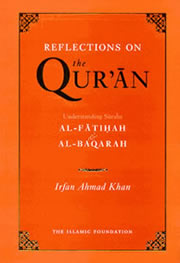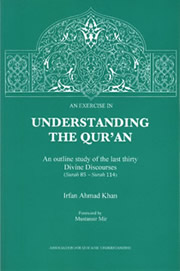In the Qur’an, God repeatedly commands human beings to use their reason (‘aql). ‘Aql is a Divine blessing. God appreciates the believers who use reason and act rationally. The Qur’an criticizes the disbelievers for following their whims and wishful thinking. These opponents act irrationally, and blindly follow their leaders and their traditions.
The Qur’an invites its readers to think: Creation is not in vain. Good and evil are not the same. So the fate of virtuous people and that of evil-doers will not be the same.
Reason (‘aql) itself is a mode of Divine guidance to man: Those who are sincerely looking for guidance and use their reason, God will surely guide them to the Truth. It is God’s special favor to human beings that God has been sending, throughout human history, prophets and messengers for the guidance of humanity. This mode of guidance is called ‘revelation.’ Through revelation God gives us knowledge of al-ghayb (the Unseen or the Hidden), the reality which, in this phase of life, lies beyond our perception. The Revelation gives, in Divine Word’s, basic guidance for the Community of the Believers. The Prophet further explains the Revealed Text through his own words and deeds and, with the cooperation of his Community of Believers, gives it a concrete and practical shape. Islamic thought and Islamic life is, in fact, a continuing process of understanding and living the Divine Text, which continues even after the Prophet has left this world. The community of the believers is expected to continue this process of understanding in changing human situations, investing all their abilities and skills in this endeavor. At the same time they also keep the example of the Prophetic guidance before their eyes.
The above is rooted in the Qur’anic concept of knowledge and reality:
The Qur’an explains that God has a two-fold relationship with the world: God creates as well as guides (20:50, 87:1-3).
Every thing and every person owes its/his existence to God. Whatever exists today, or existed earlier, was created by God. And it is only through God’s act of creation that any object will come into existence in future.
Likewise, every being in the universe follows the laws prescribed to it/him by God. All movements and changes in the vast unlimited astronomical world are guided by God and every object, big or small, follows the path prescribed to it by God. And the same is true of the subatomic world. Likewise all developments in the botanical world as a whole, and all growth or decay, even in the life of a tiny plant, follow the path prescribed for it by the Creator (e.g. 87:2-5).
The same is true of animal life (e.g. 16:68-69), which is the domain of instinctive guidance. However, human beings belong to a higher level of beings. God has blessed them with `aql, or reason, i.e. ability to understand. They can make moral judgments and distinguish between true and false. Merciful God has further helped them with revealed guidance.
Thus, Divine guidance on the human level has two modes:
(i) Innate or instrumental guidance, (ii) Revealed guidance.
Mode One of Divine Guidance to humans: The Qur’an explains, God has given to humans moral consciousness (91:7-8). Much like animals, human beings also have biological impulses. But they may choose to follow their moral judgment in spite of the fact that it goes against their biological impulses. On these occasions, it is their reason which prevails over their emotions.
The Qur’an mentions faculties of ‘sam’a´,’ ‘basar’ and ‘fu’ad’ (‘hearing,’ ‘seeing’ and ‘understanding’) as Divine blessings. See, for example, 32: 9. Humans are able to grasp the religious truths when these are conveyed to them, by the prophets and messengers of God, in the languages which their people speak. When they listen to the Ayat of the Qur’an, people feel ‘it is exactly what they were looking for!’ The Primordial Man sees the phenomena of nature as Divine signs. People perceive in these phenomena Hands of their Merciful Lord working for the benefit of human life. The Qur’anic Ayat (signs) make the same signs of nature more easily understandable to human beings, through its descriptions of these signs in clear Arabic language, In fact, due to the above mentioned innate guidance, human beings possess a potential to believe (i.e. have iman) – as if the Divine guidance were rooted in the human nature itself. And, as we keep reflecting on the Qur’anic Ayat, it is this innate guidance that enables us to understand various points of Divine Guidance. Consider the following point which the Revealed Guidance in Divine Words makes in clear terms and our religious consciousness immediately testifies to its truth:
Through the present phase of life God is testing us. A new chapter will open on Judgment Day when each of us shall stand before our Creator to account for our own performance in this life.
Human beings have `aql, or the ability to understand and make judgment, which is further refined with revelation. The believers continue their reflections upon human destiny and the purpose of human life in the light of Divine Guidance.
Mode Two of Divine guidance to humans is comprised of God’s sending prophets and messengers who received the Revelation for the guidance of humanity. They conveyed the Divine Words to their people and explained the Revealed Guidance in Divine Words in their own words and by their own practical example.
As a general rule, when the Qur’an speaks of ‘guidance’ in the narrow sense, it refers to mode two of the Divine Guidance to Man (see e.g. 2:38). However, it is due to mode one of Divine guidance that humans have a potential to receive and understand ‘guidance’ in the narrow sense (i.e. mode two of Divine guidance). The innate guidance has the nature of instrumental guidance. The revealed and the instrumental guidance work together just as our faculty of seeing works when there is light. Both our faculty of seeing as well as light are blessings from God and one can not work without the other.
Mode two of Divine guidance has also two elements:
1. A chosen servant of God who receives the Divine Words through revelation and explains it to his people in his own words and through his own practical example;
2. Revealed Guidance in Divine Words
In guiding humankind, it is The Divine Policy that God chooses one of God’s servants from humankind to communicate directly to him and to deliver God’s Message to his people. This chosen servant of God is called a ‘prophet’ or a ‘messenger.’ The prophet of God recites the Divine Words to his people and explains them through his own example and in his own words. The prophets of God work under Divine supervision. God watches that there is no mistake in their explanation and interpretation of the Divine Guidance. When needed, God would intervene and send a new revelation correcting the prophet so that in the net result there is no mistake. Thus, even though a prophet is a human being, he is infallible. When other believers make a mistake, they mutually criticize and correct each other. The prophets of God are above believers’ criticism. God criticizes them when required. Because there will be no more prophet after Muhammad (peace be upon him), now no one can claim this infallibility. No member of the believing community is above believers’ mutual criticism.


